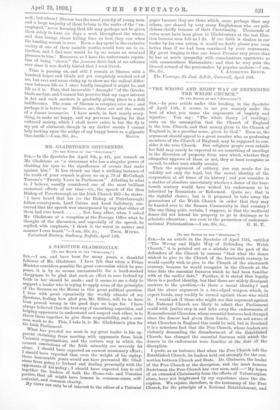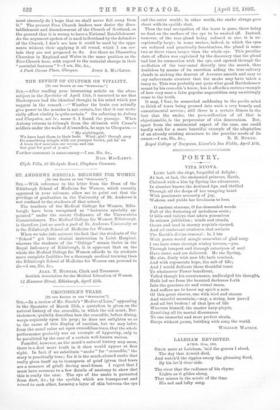[TO THE EDITOR OF THE "SPECTATOR."]
an article in the Spectator of April 15th, entitled "The Wrong and Right Way of Defending the Welsh Church," it is pointed out as a, mistake on the part of the defenders of the Church to assume "that what the donor wished to give to the Church of the fourteenth century, he would equally wish to give to the Church of the nineteenth century, because he would recognise in the Church at the later date the essential features which he had been familiar with at the earlier date." Further, it is stated that legally there is a perfect identity, but that there are widely divergent answers to the question,—Is there a moral identity P and that the above argument is a two-edged weapon, which, in expert hands, may readily be turned against those who wield it. I would ask if those who might use this argument against the National Church are likely to admit that Parliament could with justice step in and take away the endowments of Nonconformist Churches, whose essential features had changed since the donors had given them funds. I am not aware of what Churches in England this could be said, but in Scotland it is a notorious fact that the Free Church, whose leaders are violently demanding the disendowment of the Established Church, has changed the essential features with which the donors to its endowment were familiar at the date of the disruption.
quote, as an instance, that when the Free Church left the Established Church, its leaders held out strongly for the con- nection between Church and State. Dr. Chalmers, the leader of the Free Church at the disruption, and the most famous Seotchman the Free Ohara has ever seen, said :—" My hopes of an extended Christianity from the efforts of Voluntaryism alone, have not brightened by my experience since the dis- ruption. We rejoice, therefore, in the testimony of the Free Church, for the principle of a National Establishment, and most sincerely do I hope that we shall never fall away from it." The present Free Church leaders now desire the dises- tablishment and disendowment of the Church of Scotland, on the ground that it is wrong to have a National Establishment. As the argument spoken of is used in Scotland by the defenders of the Church, I don't see how it could be need by the oppo- nents without their applying it all round, which I am cer- tain they are not prepared to do. Are there no Dissenting Churches in England and Wales in the same position as the Free Church here, with regard to the material change in their essential features" P-4 am, Sir, dm, Park Circus Place, Glasgow. JOHN A. Ms.oLnon,







































 Previous page
Previous page